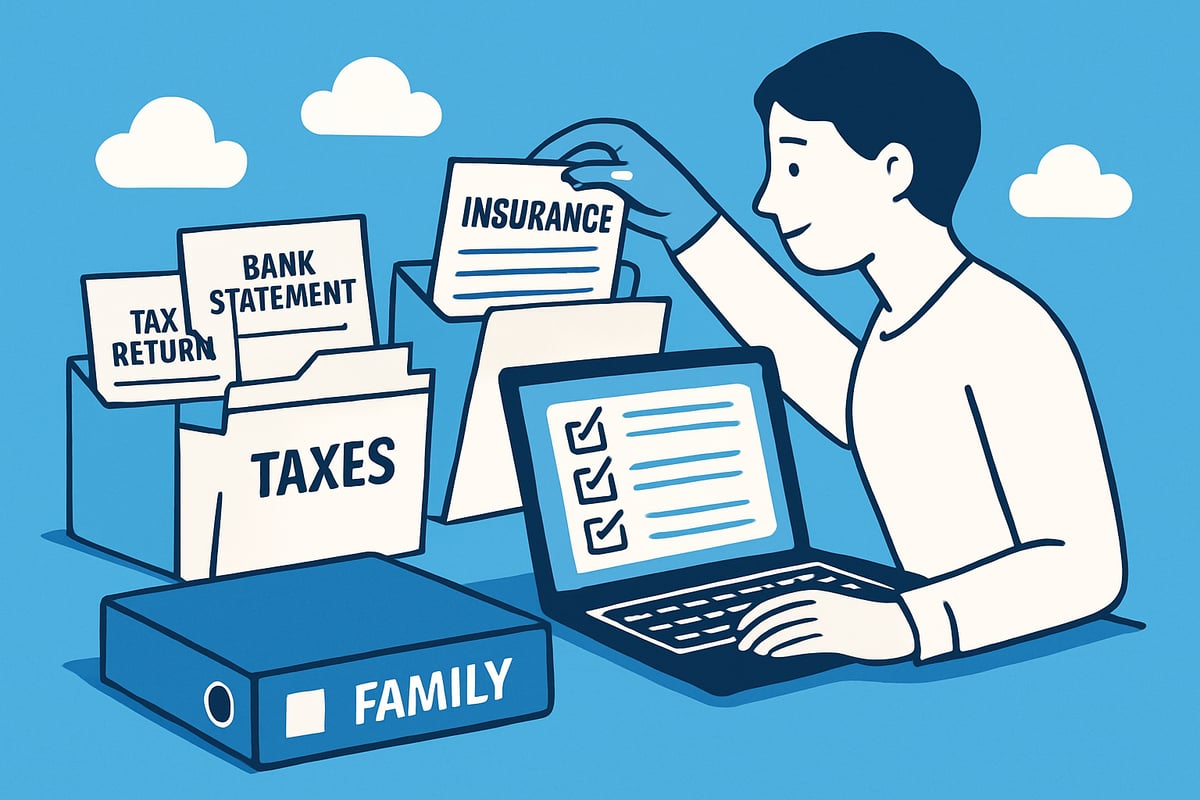In 2025, making smart financial choices is more important than ever as the world of money grows more complex and unpredictable. With this financial info guide, you’ll gain the tools and confidence to understand, organize, and take control of your finances.
This guide is designed to give you practical steps, the latest updates, and expert advice to help you make the best decisions for your future. You’ll discover the building blocks of financial literacy, new trends and technology, clear steps for organizing your money, and proven strategies for planning and investing. Get ready to access everything you need to secure your financial well-being in the year ahead.
Understanding Financial Literacy in 2025
Navigating financial info in 2025 is more essential than ever. Economic shifts and new technologies have made understanding personal finance a must. From budgeting basics to advanced digital tools, financial literacy gives you the confidence to make smarter choices. Let’s explore what financial literacy means today, why it matters, and what you need to know to stay ahead.

What is Financial Literacy and Why Does It Matter?
Financial literacy is the ability to understand and use various financial info to make informed decisions. It covers everything from managing a household budget to investing for the future. In 2025, this skill matters more than ever, as our economy becomes more digital and global.
Being financially literate not only helps you manage money, but it also improves your overall well-being. Families with strong financial info skills tend to experience less stress and greater stability. For example, knowing how to read your credit report or plan for emergencies can dramatically reduce financial anxiety. If you want to see how financial literacy rates are trending, check out these financial literacy statistics 2025 for the latest data.
Key Components of Modern Financial Literacy
Modern financial literacy includes several key areas:
- Budgeting: Tracking income and expenses, setting limits, and adjusting as life changes.
- Credit Management: Understanding credit scores and reports, and how they affect borrowing.
- Debt Management: Making smart decisions about loans, paying off debt, and avoiding pitfalls.
- Investments: Knowing your options, from traditional stocks to digital assets like cryptocurrency.
Mastering these components means you can use financial info to plan for both short-term needs and long-term goals. A solid foundation in these areas supports better choices and greater peace of mind.
The Evolving Financial Landscape
The world of financial info is changing fast. Digital banking, fintech apps, and AI-driven tools have made money management more accessible and efficient. The rise of cryptocurrencies and decentralized finance (DeFi) opens new investment opportunities and risks.
Tax laws and regulations are also growing more complex, requiring careful attention. For instance, mobile banking apps now allow you to monitor spending, transfer funds, and invest—all from your phone. Staying current with these changes helps you use financial info for smarter, safer decisions.
Common Financial Challenges in 2025
Managing financial info comes with its own set of challenges in 2025:
- Inflation: Higher prices make budgeting tougher.
- Multiple Income Streams: Many people juggle gig work, freelancing, and side hustles.
- Student Loans: Educational debt remains a major hurdle for many.
- Financial Anxiety: According to recent data, 68% of Americans feel anxious about their finances due to ongoing uncertainty.
Recognizing these challenges is the first step in using financial info to overcome them and build resilience.
The Role of Financial Education and Resources
Education is the backbone of strong financial info skills. Starting early and continuing to learn throughout life makes a big difference. Today, you can access reputable online courses, speak with financial advisors, or use government resources tailored to your needs.
Programs in schools and workplaces have shown real results, boosting confidence and knowledge for participants. By investing time in financial education, you ensure that your financial info stays current, relevant, and ready for whatever the future holds.
Essential Steps to Organize Your Financial Information
Getting your financial info in order is the first step toward building financial confidence. By following these practical steps, you can streamline your records, improve access, and ensure your financial info is always up-to-date and secure.

Step 1: Collect All Financial Documents
Start by gathering every piece of financial info you have. This includes bank statements, tax returns, insurance policies, loan agreements, investment records, and retirement account statements.
Create a checklist to track what you’ve collected. Many people find it helpful to use a printable or digital list so nothing slips through the cracks.
- Bank statements (checking, savings, credit union)
- Tax returns (at least past 3 years)
- Insurance policies (health, life, auto, home)
- Investment account details (401k, IRA, brokerage)
- Loan documents (mortgage, student loans, credit cards)
Double-check that each document is current and complete. Missing paperwork can cause issues when you need your financial info quickly.
Step 2: Categorize and Digitize Your Records
Once you have all your financial info, sort it into categories. Group documents by account type, ownership (individual, joint), and priority.
Digitizing your records makes access and updates easier. Scan papers and save them in organized folders on your computer or secure cloud storage. Use clear file names and consistent folder structures.
- Create folders for each category (e.g., Taxes, Investments, Insurance)
- Use color coding or tags for quick identification
- Include a master index file for easy reference
According to recent data, 54% of households now use digital tools for financial recordkeeping. This shift helps keep financial info safer and more accessible.
Step 3: Secure Your Information
Protecting your financial info is critical. Set strong, unique passwords for each account, and use a password manager to keep them safe.
Enable two-factor authentication wherever possible. This adds a second layer of protection to your accounts.
- Use encryption for sensitive files
- Backup your records regularly (external drive or cloud)
- Avoid sharing passwords via email or text
For example, setting up two-factor authentication on your financial info accounts can prevent unauthorized access. Data security is an ongoing responsibility.
Step 4: Regularly Update and Review
Your financial info changes over time, so set a schedule to review and update your records. Many people choose to do an annual “spring cleaning” of their finances.
Check for outdated information, such as old insurance policies or closed accounts. Update beneficiaries, account balances, and contact details.
- Schedule reviews (quarterly or yearly)
- Remove outdated documents
- Confirm that all files are organized and labeled correctly
Staying proactive with your financial info reduces stress and helps you catch issues early.
Step 5: Share Access with Trusted Individuals
In emergencies, trusted individuals may need access to your financial info. Decide who should have this access, such as a spouse, adult child, executor, or financial advisor.
Document your choices legally when needed. Setting up a power of attorney or emergency access protocols ensures your wishes are clear.
- List who has access and what they can see
- Store this list with your financial info
- Communicate your plans with those involved
Sharing your financial info wisely can offer peace of mind for you and your loved ones.
Step 6: Use Financial Organization Tools
Digital apps and software can make organizing your financial info much easier. Choose tools that fit your needs, whether that’s a simple spreadsheet or a dedicated financial planning platform.
Compare features, user-friendliness, and security:
| Tool Type | Pros | Cons |
|---|---|---|
| Spreadsheet | Customizable, free | Manual entry, error-prone |
| Finance App | Automation, reminders, secure | Subscription fees |
Some people prefer all-in-one solutions that centralize financial info and sync across devices. For a deeper dive into how binders can help, explore the Power of Financial Planning Binders.
How The Family Binder Simplifies Financial Organization
The Family Binder is a fillable PDF solution designed to keep your financial info, insurance, home, and estate documents in one place. It’s ideal for families, caregivers, retirees, or anyone wanting a comprehensive system.
This tool makes it easy to update information, prepare for emergencies, and share access with trusted individuals. Centralizing your financial info saves time and reduces stress during critical moments.
The Family Binder complements other financial planning tools by providing a user-friendly, printable backup. It’s a smart way to ensure your financial info is always organized, secure, and accessible.
Smart Financial Planning Strategies for 2025
Making smart financial decisions in 2025 means having a plan that adapts as your life and the economy change. The right strategies let you take control of your financial info, no matter your starting point. Let’s break down the key steps to build a strong foundation for your future.

Setting Realistic Financial Goals
The first step to mastering your financial info is setting clear and achievable goals. Think about what you want to accomplish both in the short term and long term. Use the SMART framework—Specific, Measurable, Achievable, Relevant, and Time-bound—so your goals are practical.
For example, you might set a target to save $10,000 for a home down payment in two years or pay off a credit card by the end of the year. Breaking goals into smaller milestones keeps you motivated. Need help organizing your objectives and tracking progress? Check out the Family Financial Planner Guide for practical tips on managing your financial info.
Building a Budget That Works
A solid budget is the backbone of your financial info. Popular methods include zero-based budgeting, where every dollar is assigned a job, the 50/30/20 rule, which divides your income into needs, wants, and savings, and the envelope system, which uses cash for spending categories.
Start by tracking your expenses. Many apps now analyze your spending and suggest ways to save, making budgeting less tedious. In 2025, households are focusing on flexible budgets that can adjust as income or expenses shift. Regular reviews ensure your budget aligns with your changing lifestyle and financial info.
Managing Debt Effectively
Debt can be overwhelming, but with the right financial info, you can take charge. Start by listing all your debts—credit cards, student loans, or personal loans. Understand the difference between good debt (like mortgages) and bad debt (like high-interest credit cards).
Choose a payoff strategy that fits you. The debt snowball method focuses on paying off the smallest balance first for quick wins, while the avalanche method targets high-interest debt to save money over time. Debt consolidation loans can also help lower your interest rates and simplify payments. Stay proactive by reviewing your financial info every month.
Planning for Major Life Events
Major life events—marriage, having children, buying a home, or retiring—require careful planning and up-to-date financial info. Each event brings new expenses and opportunities, so adjust your plans accordingly.
For example, set up an emergency fund before expanding your family, or review insurance needs when buying a home. If you face unexpected situations like job loss or illness, having a cushion can protect your progress. Build flexibility into your plans so your financial info adapts as your life evolves.
Leveraging Technology for Financial Planning
Technology is changing the way we manage financial info. AI-powered budgeting apps, robo-advisors, and automated investment platforms offer personalized recommendations and real-time tracking.
Try using a mix of tools to find what works best for you. Some apps connect all your accounts for a full financial overview, while others specialize in investment or debt management. Case studies show that people using these tools consistently increase savings and reduce financial stress. Keep your financial info secure by enabling features like two-factor authentication.
Staying Informed and Adapting to Change
The financial world moves fast. To keep your financial info up-to-date, monitor news about inflation, policy changes, and market trends. Adjust your plans as needed—if expenses rise, tweak your budget. If interest rates change, review your loans or investments.
Stay connected with reputable sources and join communities where you can share experiences and learn from others. The more informed you are, the more confidently you can adapt your financial info to any situation.
Investment Trends and Opportunities in 2025
Navigating the investment landscape in 2025 is an essential part of mastering your financial info. With new opportunities and risks emerging every year, understanding where to invest and how to manage your portfolio can make all the difference between reaching your goals and falling behind. Let’s break down the investment trends you need to know for smarter financial info management this year.

Overview of Traditional Investment Options
Traditional investment vehicles remain the foundation of most people’s financial info. Stocks, bonds, mutual funds, and ETFs offer accessible ways to build wealth over time. Each has its own risk and reward profile. For instance, stocks historically provide higher returns but with more volatility, while bonds offer stability and income.
| Asset Class | Potential Return | Risk Level |
|---|---|---|
| Stocks | 7-9% | High |
| Bonds | 3-5% | Low-Medium |
| Mutual Funds | 5-8% | Varies |
| ETFs | 5-8% | Varies |
In 2024, stocks averaged a 7.5% return, while bonds trailed at 4%. Including these options in your financial info ensures a balanced approach to growth and security.
Emerging Investment Vehicles
The world of financial info is rapidly evolving with new asset classes. Cryptocurrencies like Bitcoin and Ethereum have become mainstream, offering both high risk and the potential for outsized returns. NFTs and other digital assets are also gaining traction, especially among younger investors.
Real estate crowdfunding allows you to invest in property with lower capital, while peer-to-peer lending connects you directly with borrowers. Sustainable and ESG (Environmental, Social, Governance) investing is growing, letting you align your financial info with your values. Staying updated on these trends helps you diversify beyond the basics.
Diversification and Risk Management
A key principle in managing your financial info is diversification. By spreading investments across different asset classes, you can reduce the impact of market swings. Tools like portfolio analyzers and robo-advisors help assess your current mix and suggest changes.
Risk Management Checklist:
- Review your asset allocation annually
- Use stop-loss orders for volatile assets
- Rebalance your portfolio as life changes
During periods of market volatility, diversified portfolios typically experience less drastic losses. This approach keeps your financial info resilient, even when markets get unpredictable.
Tax-Efficient Investing Strategies
Maximizing returns means paying attention to taxes in your financial info. Tax-advantaged accounts—such as IRAs, 401(k)s, and HSAs—offer significant benefits. Harvesting investment losses can offset gains, and optimizing when to sell assets may lower your tax bill.
| Account Type | Tax Benefit |
|---|---|
| IRA | Tax-deferred/growth |
| 401(k) | Employer match, tax-deferred |
| HSA | Triple tax advantage |
For a detailed look at organizing your tax documents and conducting annual reviews, check out Simplifying Taxes and Annual Reviews. Efficient tax planning is a cornerstone of smart financial info management.
Accessing Professional Advice
Sometimes your financial info benefits from expert guidance. Knowing when to consult a financial advisor—such as during major life changes or when managing complex investments—can save you time and money.
Human advisors offer personalized strategies, while robo-advisors provide automated, data-driven advice at a lower cost. Here’s a comparison:
| Advisor Type | Pros | Cons |
|---|---|---|
| Human | Personalized, holistic | Higher fees |
| Robo-Advisor | Affordable, automated | Less customization |
Assess your needs and weigh the benefits of each option. The right advice can turn uncertainty in your financial info into confident action.
Protecting Your Financial Future
Safeguarding your financial info is a crucial step for long-term security and peace of mind. In today’s digital world, risks and opportunities evolve quickly. Let’s explore how you can shield your finances, assets, and family from unexpected setbacks.
Building an Emergency Fund
An emergency fund acts as your safety net, protecting your financial info and well-being when life throws curveballs. Experts suggest saving three to six months’ worth of expenses in a separate, easily accessible account.
Start small if you need to, and set up automatic transfers to build your fund consistently. Choose a high-yield savings account for better returns. During recent economic downturns, families with emergency funds were able to cover medical bills, car repairs, or job loss without tapping into retirement savings or taking on debt.
Regularly review your financial info to make sure your emergency fund matches your current needs. This habit ensures your safety net keeps pace with your life.
Insurance Essentials in 2025
Insurance is a pillar of financial protection in 2025. It shields your financial info from risks like illness, accidents, or property damage. The main types to consider are:
- Health insurance for medical emergencies
- Life insurance for family security
- Disability insurance to protect income
- Property insurance for your home and assets
- Liability insurance for unexpected legal costs
When evaluating policies, compare coverage, premiums, and exclusions. Adjust your coverage as life changes, like after marriage or buying a home. Trends show that insurance premiums are rising, making it vital to regularly review your financial info and shop around for the best value.
Estate Planning Basics
Estate planning is more than just writing a will. It involves organizing your financial info so your wishes are honored and your loved ones are protected. Key steps include:
- Drafting a will to outline asset distribution
- Setting up trusts for specific needs
- Assigning power of attorney for financial decisions
- Naming beneficiaries on accounts and insurance
Incomplete estate plans can cause delays and stress for families. By keeping your financial info organized and up to date, you ensure a smoother transition for your heirs. Review your documents annually, especially after major life events.
Identity Theft and Fraud Prevention
Protecting your financial info from identity theft is more important than ever. Common threats in 2025 include phishing scams, data breaches, and financial fraud.
To protect yourself:
- Use strong, unique passwords for each account
- Enable two-factor authentication where possible
- Monitor your accounts and credit reports regularly
- Freeze your credit if you suspect a threat
Data shows that cybercrime and financial fraud continue to rise each year. By staying vigilant and updating your security habits, you can prevent significant losses and stress related to your financial info.
Safeguarding Digital Assets
As digital assets become more common, managing your online accounts and cryptocurrencies is a key part of your financial info strategy. Keep a secure record of passwords and wallet keys, and use encrypted storage solutions.
Plan for your digital legacy by designating someone to access your accounts if needed. Update these plans as you acquire new assets or platforms change security protocols. Following best practices, such as using hardware wallets for crypto, gives you added peace of mind that your financial info is safe.
Teaching Financial Responsibility to Family Members
Empowering your family with financial info and skills ensures they are ready for whatever comes their way. Use age-appropriate strategies to teach kids, teens, and adults about budgeting, saving, and responsible spending.
Hold regular family meetings to discuss financial goals and decisions. Real-life scenarios help everyone build confidence. For actionable ideas, check out Teaching Financial Responsibility to Children, which offers tips for making financial info relatable and practical for all ages.
By prioritizing financial education, you create a legacy of smart decision-making and resilience in your family.
Resources for Ongoing Financial Success
Equipping yourself with the right resources is key to making the most of your financial info and setting yourself up for success in 2025. The financial world is evolving quickly, so having access to reliable tools, learning opportunities, and support systems can make all the difference.
Top Financial Tools and Apps for 2025
Choosing the right apps can streamline how you manage your financial info every day. In 2025, leading platforms offer features like AI-driven budgeting, automated investment tracking, and real-time alerts.
- Budgeting: Apps like YNAB and Mint help track spending and savings goals.
- Investing: Robinhood and Fidelity offer user-friendly investment monitoring.
- Expense Tracking: PocketGuard and Personal Capital provide holistic overviews of your financial info.
When selecting a tool, look for robust security, seamless syncing, and positive user reviews. Many households now rely on digital solutions to keep their financial info organized, making everyday management much simpler.
Recommended Books, Courses, and Podcasts
Continuous learning is vital for anyone looking to make smarter financial decisions. Top-rated books like "The Psychology of Money" and "Your Money or Your Life" break down complex financial info into actionable steps.
- Books: Updated editions often reflect the latest trends.
- Courses: Online platforms such as Coursera and Udemy offer personal finance classes for all levels.
- Podcasts: "ChooseFI" and "Planet Money" keep you informed while on the go.
Investing time in these resources ensures your financial info knowledge grows along with changing financial landscapes.
Government and Nonprofit Support Services
Government and nonprofit organizations are invaluable for those seeking trustworthy financial info and assistance. Free counseling, debt relief programs, and educational workshops are widely available.
You can access up-to-date federal resources through Federal financial literacy initiatives 2025, which outlines new programs and budgeting for public financial info education. Nonprofits like the National Foundation for Credit Counseling also provide confidential help for managing debt and building financial skills.
These services ensure everyone, regardless of background, can access quality financial info and guidance.
Community Groups and Peer Support
Learning from others can make a big impact on how you handle your financial info. Online forums, local workshops, and social media groups bring together people with similar goals and challenges.
- Forums: Communities like Bogleheads and Reddit’s r/personalfinance offer peer advice.
- Workshops: Local libraries and community centers host in-person events.
- Social Media: Facebook groups and Discord channels provide ongoing support.
Sharing experiences and tips can help you get more from your financial info and stay motivated to reach your goals.
Creating Your Personalized Financial Info Guide
Building a customized financial info guide ensures you have everything you need in one place. Start by gathering your key documents, then organize them with checklists or digital templates.
- Use cloud-based options for easy access and updates.
- Incorporate reminders for regular reviews.
- Tailor your guide to cover budgeting, investments, insurance, and more.
With a personalized approach, your financial info becomes a powerful tool for ongoing success. Make it a living document that evolves as your needs and goals change.
Now that you’ve explored how to organize your financial info and set yourself up for success in 2025, why not make it even easier to put these tips into action? With The Family Binder, you can keep all your accounts, insurance details, home records, and estate plans in one secure, editable PDF—no more digging through paperwork or wondering where things are. It’s a simple way to make sure your loved ones can always find what matters most. Ready to take the next step toward peace of mind and financial clarity?
Download Now

